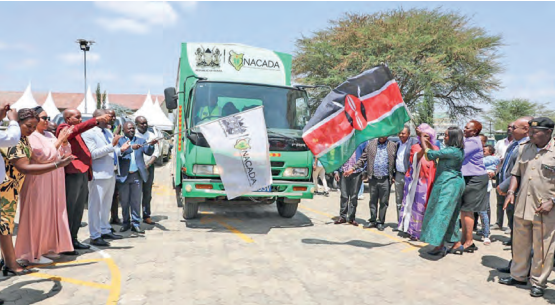

The Ministry of Health has started plans to establish public rehabilitation centres to help thousands of Kenyans struggling with addiction.
Naomi Shaban, the chairperson of the Tobacco Control Board, said the programme will see the centres established in 10 hotspot counties.
“Our Health Cabinet Secretary, Deborah Barasa, has already given the direction that this has been in the law but has not been implemented in the past and needs to be done now,” Shaban said.
The chairperson said many people requiring rehabilitation services have been forced to seek help from private facilities that are very expensive.
Speaking in Laikipia during a visit to the county government, Shaban lauded Governor Joshua Irungu for committing to set aside land for a rehabilitation centre within the Nanyuki Teaching and Referral Hospital.
By next week, she said, a team from the Health Ministry and Public Works Department will be visiting the site to plan the centre’s establishment.
“We are happy that today, after discussions with the governor, he has expressed desire to have the project started as soon as possible and hopefully, construction works should have started before the end of the financial year”.
Shaban said rehabilitation from addiction is an expensive process that condemns many to a life of misery due to lack of funds.
The centres will act as regional hubs and will also serve surrounding areas.
“We have looked at the hotspots and the 10 were carefully considered so that we can start helping the people facing the challenge of addiction who many times don’t know where to turn for help.”
The board plans to undertake public awareness campaigns on the health impacts of tobacco and nicotine products, targeting all regions across the country with the aim of curbing the growing challenges posed by the products.
While officiating a public awareness campaign in Nanyuki, the Health CS reiterated the government’s commitment to the implementation of the World Health Organization Framework Convention on Tobacco Control and the enforcement of existing public health regulations WHO FCTC was adopted in 2003 but came into force in 2005, with 182 countries being parties with the goal of tackling the causes of the global tobacco epidemic.
The campaign, which included a three-day sensitisation workshop, brought together stakeholders such as healthcare workers, Community Health Promoters and law enforcement officers to strengthen the response to substance abuse.
Barasa underscored the need for multi-sectoral collaboration to address the growing prevalence of drug and substance abuse especially among the youth.
“Using tobacco products can lead to lung conditions and other chronic illnesses such as hypertension. We are deliberating with the Tobacco Control Board to have funds set aside for the rehabilitation programme and also look at how the survivors can be reintegrated back into the society,” she said.
Barasa visited facilities within Laikipia to monitor the progress of Taifa Care’s implementation.
She noted that some patients in
the county hail from nomadic communities and visit health facilities
without identity cards.









